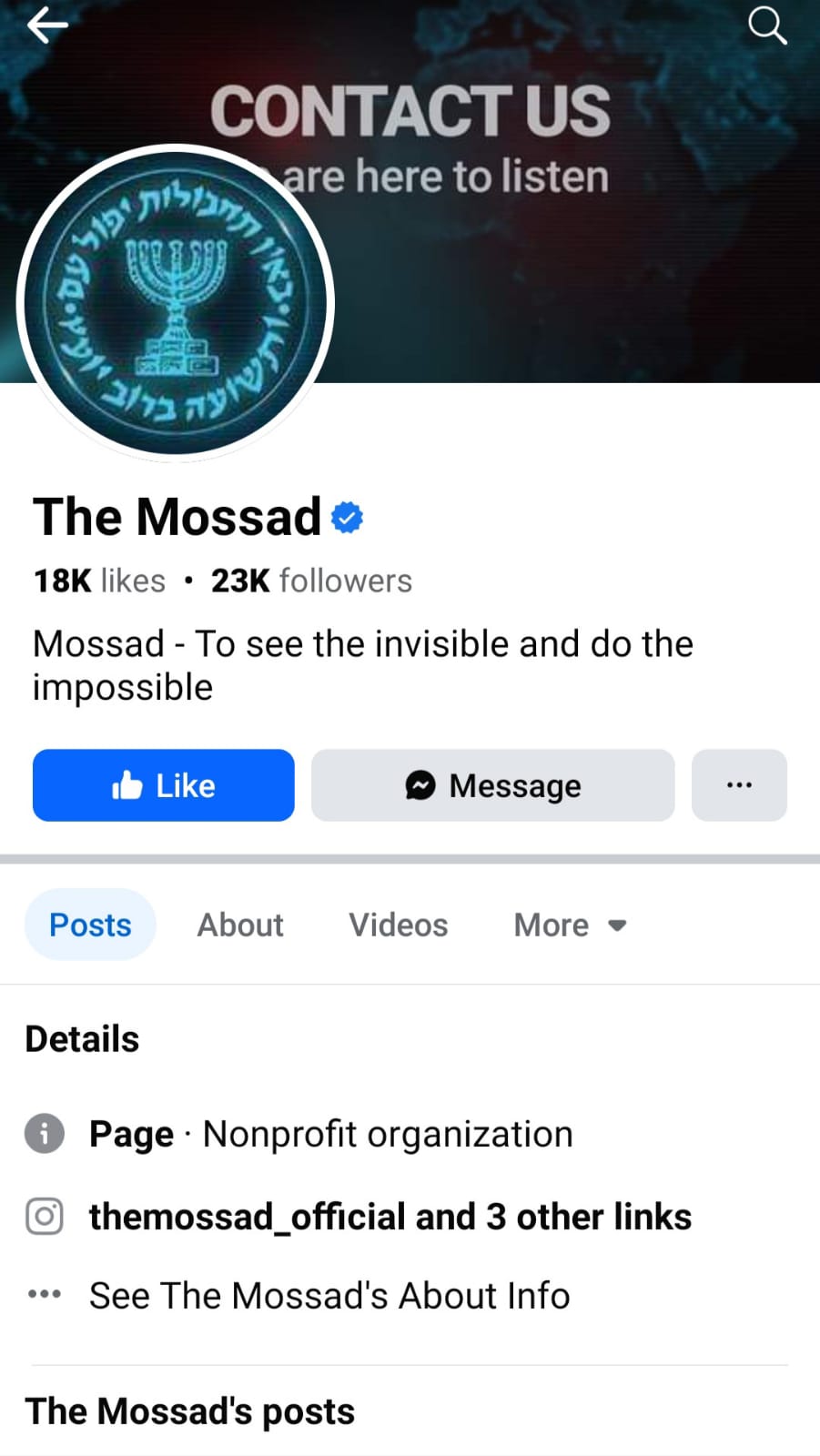
A man holding an Israeli flag. (Credit: AFP/Illustration/File photo)
BEIRUT — A Facebook page, operating under the name of "The Mossad" and marked with the blue tick signaling “authenticity” through verification, has been using targeted adverts online to ask people in Lebanon to get in contact with them.
The page belongs "somehow to the Israeli intelligence" even if it is not mentioned on the official website of Mossad, Israel's foreign intelligence agency, according to Mohamad Najem, executive director of SMEX, a Lebanese NGO that advocates for human rights in digital spaces.
According to the Meta Help Center, the blue verification tick can signal “a notable person, brand, or entity,” but it can also be purchased as a subscription to Meta Verified. Paying for the blue tick still requires verification through a government-issued ID and, according to the Meta Help Center, “the ID must match the profile name and photo of the Instagram or Facebook account.”
The Facebook page, which purports to belong to Israel’s foreign intelligence agency, has a cover photo that reads: "Contact us, we are here to listen." While the page's first post was published in 2018, "The Mossad" only became active this year. It now has around 23,000 followers.
It comes as cross-border tensions between Hezbollah and Israel have increased in the last week, following nearly nine months of almost daily exchanges of fire between both sides since the war in Gaza began in October. At least 470 people in Lebanon (including 352 Hezbollah fighters killed in Lebanon and Syria) and 27 in Israel have been killed.
Ads 'breaching Lebanese laws'
On June 19, The Mossad page published an ad with a picture of a woman and a caption saying: "Call us, we're waiting for you.”
“It's time for you ... to change your life, send us a message and you won't regret it. For your safety — don't like the post. Write to us privately," the ad says.
 Screenshot/Facebook
Screenshot/Facebook
According to Najem, it seems that these ads are “not illegal according to Meta's rules.” However, it "should be illegal because it is a breach of Lebanese laws."
Lebanon's 1955 law on boycotting Israel prohibits interaction between Lebanese and Israelis. It prohibits any individual or legal entity from entering into contact with Israelis or people residing in Israel. It also prohibits all commercial, financial and other transactions. The penalty for violating this law is three to ten years of hard labor.
Najem added that "Meta is responsible for protecting its users and not allowing other security agencies, especially in a situation like Lebanon and Israel, to target people with ads."
L'Orient Today contacted Meta for comment but did not receive a response. Lebanese security sources also contacted on the matter did not have any information to share regarding the Facebook page.
Asked about whether the ads on The Mossad serve to recruit people in Lebanon to work for Israel or to spy on Lebanese people, legal consultant and professor Janane El Khoury said that the page might have been trying to accomplish these two objectives simultaneously.
“Israel is a master of cybersecurity,” Khoury said. “The past years have demonstrated Israel's use of cyberspace against Lebanon in several ways, including the use of the internet to recruit agents and communicate with them and gather news about its targets in Lebanon.”
Israeli cyber strategies have also resulted in the installation of a “large number of spy systems” across Lebanon, according to Khoury.
Between 2019 and the end of 2022, according to AFP numbers, Lebanese security forces arrested 185 people suspected of "collaboration" with Israel.
Since the cross-border clashes between Hezbollah and Israel began last October, and several subsequent assassinations by Israel of Hezbollah and Hamas members, the Party of God has been worried about being infiltrated by agents working on behalf of Israel. Its leader, Hassan Nasrallah, warned his partisans of the risks associated with smartphones, calling them a "spy device that can be controlled" and asked people in southern Lebanon to "throw" them, during a speech given on Feb. 13 — a month after the killing of senior Hamas leader, Saleh al-Arouri, in a drone strike that hit a specific floor of a southern Beirut building,
What can be done to remove these ads?
Najem advises people to "block these ads or report them" and to not engage with them. Khoury urges citizens to "inform the competent security agencies when they receive any suspicious communication" and to "protect their personal data to prevent it from being breached by Israel."
Khoury is calling for the government to do more to improve Lebanon's cybersecurity. The country ranked 109th out of 182 in the world in the Global Cybersecurity Index report prepared by the International Telecommunication Union, released in 2020. Israel ranks 36th globally. In January Beirut's Rafik Hariri International Airport suffered a severe cyberattack targeting several of its IT systems and prompting a wave of concern about the safety of travelers.
Lebanon lacks a “unified institutional effort” and a “unified strategy” necessary for improving state cybersecurity, Khoury said, at a time when general state security very much depends on it. She has called for the government to update its general policy in the Information and Communication Technologies (ICT) sector. A “general vision, specific goals and prioritized objectives” should be established to “prevent Israeli hostile intrusions.”
Najem called for the Lebanese government to ask Meta not to allow the targeted ads by The Mossad to be proliferated on its platform.
The ministries of telecommunication and information were not immediately available to respond to these comments when approached by L'Orient Today.

